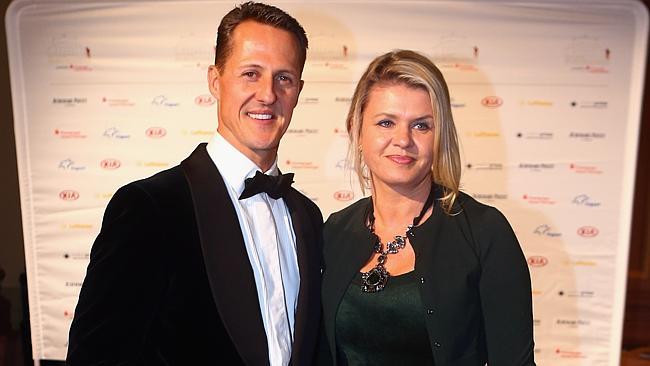Different faces of a ruthless competitor and generous man
ONE was the man who seemed devoid of emotion after Ayrton Senna was killed. The other Schumacher was one the world rarely glimpsed.

ONE was the man who seemed devoid of emotion after Ayrton Senna was killed in the 1994 San Marino Grand Prix. Michael Schumacher was closest to the crash, only a few lengths behind the Brazilian as, fighting to fend off this young German challenger, Senna slammed into the wall at the Tamburello curve.
That was when the legend of the German hard man began to form. Schumacher the arrogant, Schumacher the tough - worse still, Schumacher the cheat. Anything to win. After all, the evidence was clear: disqualified from the 1997 world championship for trying to drive Jacques Villeneuve off the track to stop the Canadian winning the title; parking his car across the Monaco track to stop Fernando Alonso taking pole position; winning his first title by seemingly steering his Benetton into Damon Hill's Williams.
The other Michael Schumacher was one the world rarely glimpsed. He liked a cigar and a Bacardi, adored his children, Mick and Gina-Maria, and was beloved by a Ferrari team that he moulded around him to win five back-to-back titles. He rarely spoke about Senna's death but the emotional scars ran deep.
There is the Schumacher who accidentally ran over a child's foot with his scooter on the Silverstone perimeter road before the British Grand Prix. He raced back to find the child and gave him a signed shirt and cap as an apology. There is the Schumacher who threatened to kill David Coulthard after they crashed at the 1998 Belgian Grand Prix and there is the Schumacher who wept in front of a global audience after the 2000 Italian Grand Prix on being told he had tied with Senna in the number of races he had won.
Three years later at Imola, Schumacher qualified his car on pole position for the San Marino Grand Prix and then hopped on to a private plane to fly home to Kerpen in Germany to say farewell to his mother, who died that night. He was back the next day to win the race, publicly cold, privately distraught.
Schumacher's career seems to have been steeped in such controversy and so many incidents that it seems hard to imagine the human face of a man who turned into a machine at the wheel of a F1 car. But he is human, very human.
The sun was setting late one Saturday night as I was leaving the circuit. Most of the drivers and engineers had gone and Schumacher was standing in the doorway of the Ferrari motorhome, licking an ice cream. He never went home early and had been poring over the technical data provided by his engineers to find even a hundredth of a second of improvement. It was that attention to detail and work ethic that has been copied to great effect by Sebastian Vettel, the young countryman whom Schumacher has mentored and inspired to four world championships of his own.
We exchanged greetings and I asked how the kids were doing. They were toddlers then and Schumacher did not like them coming to the track but he knew they watched on TV. Gina-Maria had given him a good luck charm, he said, to keep him safe. I told him he would need it, not for F1, but because we were due to play one of our regular England v Germany football matches soon. It was for journalists, but Schumacher had become Germany's "ringer", delighted to turn out for a game of his beloved soccer, anywhere and any time.
Schumacher scored and Germany won, of course. Schumacher shook hands with every player at the end and then was off. Next day, he won the race. Schumacher was built to win; that is what he has been doing since he was four years old. Now he faces the greatest battle of his life.
THE TIMES


